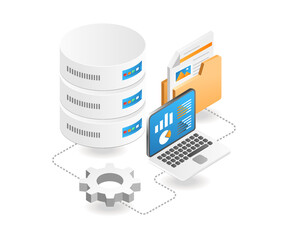Why use a database?
Database is an essential part of our life. As we encounter many activities which involve our interaction with the database, for example in bank, in railway station, in school, in grocery store, etc. These are the instances where we need to store large amount of data at one place. And get these data easily.
There are some points by which we can say that we should use database to manage our data:
- Databases are capable of storing large number of records in an effective manner.
- Finding data is incredibly simple and quick.
- It is easy to add new data and modify or delete available data.
- Data can be easily searched in the database by using techniques like indexing, binary searching etc.
- The data in the database can be sorted quickly and easily.
- Data can be easily imported into other applications.
- The database is multi-access means that more than one person can access the same database at the same time.
- The security of data in a database is higher than that of physical paper files because the database provides additional security patterns for authorized access.
- Databases are also used for transaction management. Transaction is a set of events used for some logical term, database is used to maintain consistency and accuracy during transactions.
- Some more advantages are the accessibility, integrity and security that databases provide. That is why we prefer database for data storage.
Important definition
Data: Data This is raw and unprocessed. Ex- Name, Category, Marks etc.
Notification: When data is processed. "Record is also information". Example - passed or failed table etc.
Database: An organized collection of data and information or interrelated data collected in one place.
DBMS (Data Base Management System)
A database management system is a software used to store and retrieve databases. For example, Oracle, MySQL, etc.; These are some of the popular DBMS tools.
- DBMS provides interface to perform various operations like creation, deletion, modification etc.
- DBMS allows the user to create their own database as per their requirement.
- DBMS accepts requests from applications and provides specific data through the operating system.
- DBMS consists of a set of programs that perform tasks as per the instructions of the user.
- It provides security to the database.
Advantage of DBMS
- It stores all the data in a single database file, so it can handle data redundancy.
- An authorized user can share data among multiple users.
- It provides backup and recovery subsystem. This recovery system creates automatic data from system failure and restores the data if necessary.
- It provides different types of user interface like GUI, Application Interface.
Disadvantages of DBMS
- It takes large disk space and large memory to run efficiently.
- DBMS requires high-speed data processor and large memory to run DBMS software, so it is expensive.
- DBMS creates additional complexity and requirements.
 Reviewed by Sarvgya
on
July 14, 2023
Rating:
Reviewed by Sarvgya
on
July 14, 2023
Rating:













No comments: